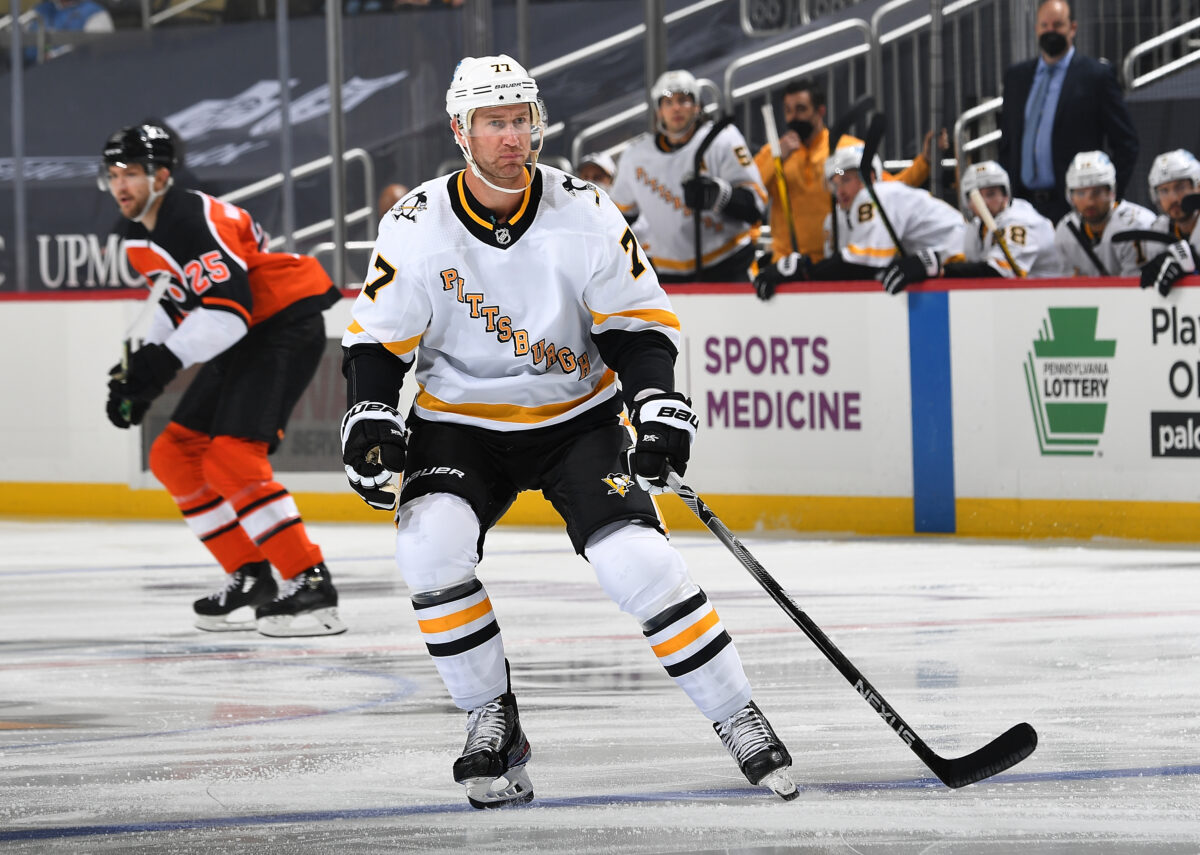The Pittsburgh Penguins have been on a seemingly endless search for a third-line center since Nick Bonino left for the Nashville Predators in the 2017 offseason.
Derick Brassard was thought to be the answer but managed just 23 points (12 goals, 11 assists) in 54 games with Pittsburgh in 2018 and 2019. Nick Bjugstad was next and had 16 points (10 goals, six assists) in 45 games before being dealt to the Minnesota Wild on Sept. 12, 2020.
The Penguins might finally have the right guy in Jeff Carter, though. Acquiring Carter in a trade from the Los Angeles Kings on April 12 has possibly provided similar depth to that of Pittsburgh’s past three Stanley Cup championship teams, which either had Jordan Staal (2009) or Bonino (2016, 2017) as a third-line center.
A trade could change things before next season, but let’s look at each of the Penguins’ four centers as things currently stand.
Sidney Crosby
Slightly more than a month away from his 34th birthday on Aug. 7, Sidney Crosby remains one of the NHL’s more dominant forwards at both ends of the ice. Penguins coach Mike Sullivan often calls Crosby the best 200-foot player in the league, and that could remain true next season.

Crosby, who finished fourth in Hart Trophy voting and was a Ted Lindsay finalist this season, had three points (two goals, one assist) in a 7-3 win against the Philadelphia Flyers on May 4. It was his 151st game with at least three points, which is the most since he entered the NHL in 2005-06. Washington Capitals forward Alex Ovechkin is second with 116 in that span.
The Penguins captain is the first player in their history with at least 20 goals in 13 different seasons. Crosby, who had 62 points (24 goals, 38 assists) in 55 games this season, joined Wayne Gretzky (first 19 seasons) as the only players to average at least a point per game in their first 16 NHL seasons.
Crosby has developed into a more defensive-minded center with a strong forecheck. Also, one of the best facilitators in the league, Crosby helped linemates Jake Guentzel (23 goals) and Bryan Rust (22) combine for 55 goals this season. But Crosby has gone silent the past three Stanley Cup Playoffs, having six points (three goals, three assists) in 14 games. In order for the Penguins to take full advantage of their perceived improved center depth, they’ll need Crosby to return to the form that earned him the Conn Smythe Trophy as playoff MVP in 2016 and 2017.
Evgeni Malkin
Maybe not the force he once was, Evgeni Malkin is still capable of turning any game in Pittsburgh’s favor when he’s appropriately focused.
Malkin struggled (by his standards) with 72 points (21 goals, 51 assists), an NHL career-worst minus-25 rating and team-high 89 penalty minutes in 68 games during the 2018-19 season. He then rebounded with 74 points (25 goals, 49 assists), a plus-7 rating and 58 penalty minutes in 55 games last season.

This season was up-and-down for the second-line center, who will turn 35 on July 31. After starting with 12 points (four goals, eight assists) in the first 20 games, Malkin had four goals and eight assists on an eight-game point streak before sustaining a knee injury against the Boston Bruins on March 16.
Malkin was out until May 3 and played four games before missing Pittsburgh’s regular-season finale against the Buffalo Sabres. He was also sidelined in the first two games of a first-round series against the New York Islanders, which the Penguins lost in six games. Despite the knee injury, which required surgery that will keep him out at least through the upcoming training camp, Malkin was tied for second on the Penguins in playoff scoring with five points (one goal, four assists) in four games.
The question will be if lingering effects from the knee surgery impact Malkin upon his return next season.
Jeff Carter
It would probably be unfair to expect Carter, 36, to repeat what he accomplished late this season with the Penguins. He had nine goals in 14 games following the trade from Los Angeles, including an NHL career-high four goals against the Sabres on May 6.

Carter then led Pittsburgh with four goals in the playoffs, scoring twice in Game 3 against the Islanders and once in Games 2 and 6. A two-time Stanley Cup champion (2012, 2014) with the Kings, Carter has added more veteran leadership to a group that already has three-time champions Crosby, Malkin and defenseman Kris Letang.
At 6-foot-3, 219 pounds, Carter has the size the Penguins normally lack. That has further rejuvenated forward Jared McCann, who had 11 points (three goals, eight assists) in 14 games, mostly as Carter’s left wing after the trade.
Carter might not be able to maintain his scoring pace from late this season, but if he brings anything close to that quality next season, he’d be the most dependable third-line center the Penguins have had since Bonino.
Teddy Blueger
Often overlooked, Teddy Blueger is the prototypical fourth-line center. And not in a bad way.
Three seasons into his NHL career, the former second-round pick in 2012 isn’t going to light up the scoresheet. But Blueger does have the ability to give Pittsburgh a necessary goal here and there. He averaged 14:51 of ice time this season but finished with 22 points (seven goals, 15 assists) in 43 games.

More importantly, Blueger’s fourth line didn’t give up much. He was a plus-10 this season, which was tied for seventh on the Penguins and fourth among their forwards. He averaged .512 points per game this season, on pace for 42 points in a normal 82-game campaign.